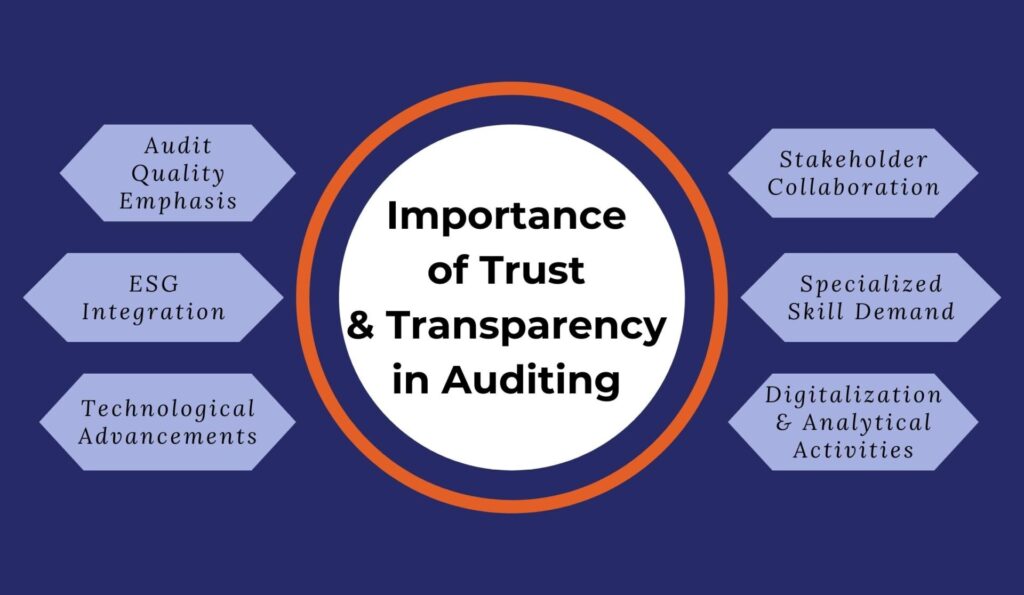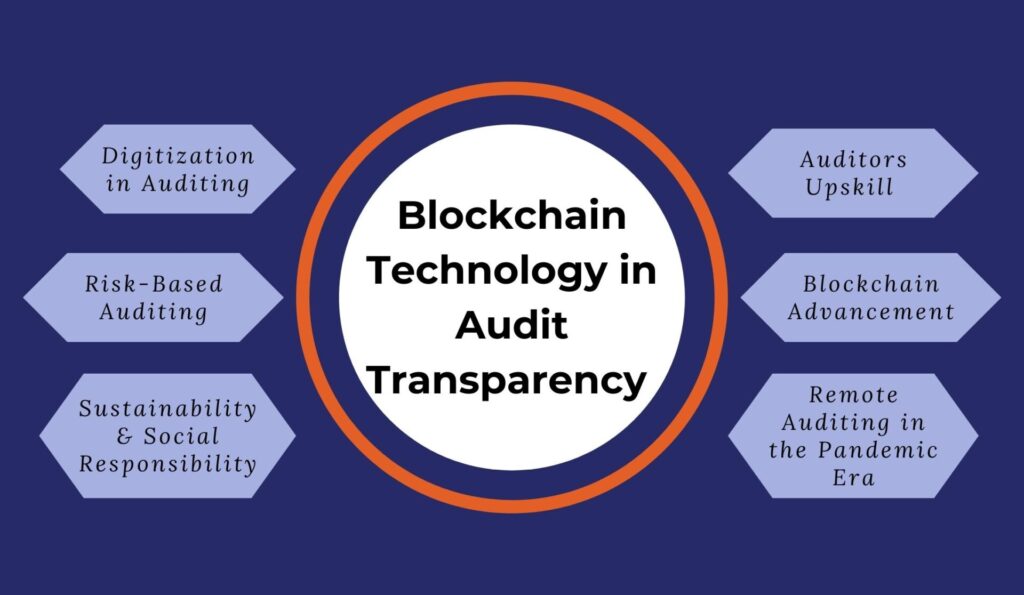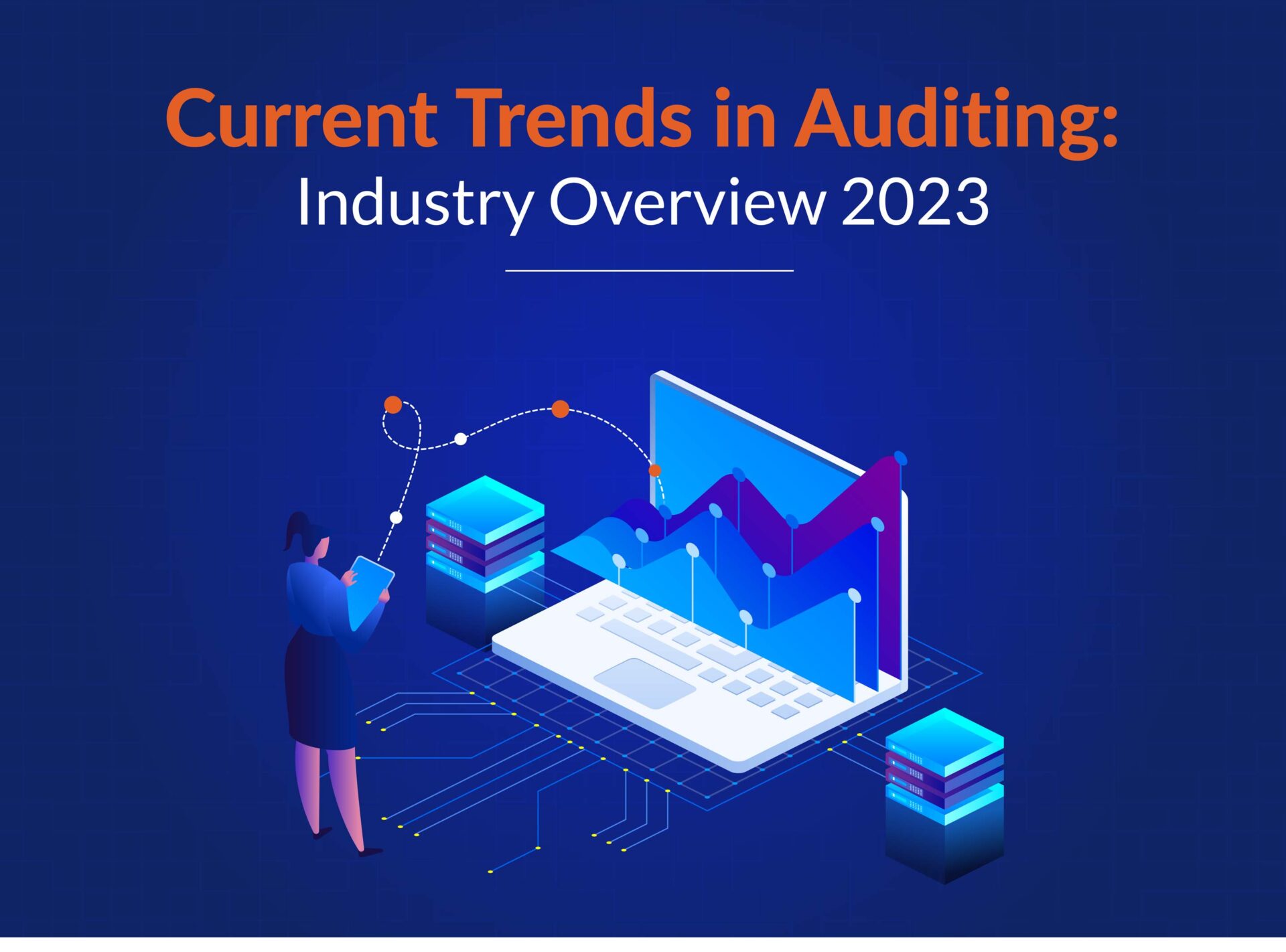With the ever-growing technology, the way we do audits is changing a lot. In this article, we’ll talk about the new and popular ways of doing audits this year. With the help of things like computers, data tools, and online platforms, auditors are finding better ways to do their work.
It’s important for everyone in the audit world to know about these changes to do their jobs well. Let’s dive in and learn about these exciting updates together!
Top 12 Current Trends in Auditing Industry
Discover the most exciting trends in the auditing industry! Our list of the top 10 current trends in Auditing keeps you up to date with the latest developments, making auditing easy to understand and follow.
1. The Importance of Trust and Transparency in Auditing
In the changing landscape of auditing, trust and transparency are key. Recent corporate scandals have emphasized the significance of audit transparency and quality. Explore the transformative influence of technology, ESG considerations, stakeholder collaboration, and specialized skills on the audit profession:

- Audit Quality Emphasis: Recent corporate scandals underscore the critical need for maintaining high standards of audit transparency and quality.
- Technological Advancements: Auditors are harnessing cutting-edge technologies like AI and data analytics to optimize audit efficiency and effectiveness.
- ESG Integration: Environmental, Social, and Governance (ESG) factors are gaining prominence as integral components of audit processes.
- Stakeholder Collaboration: Collaboration between auditors, shareholders, and regulators has become paramount for robust audit outcomes.
- Specialized Skill Demand: The growing demand for auditors with specialized expertise in areas such as cybersecurity and sustainability are reshaping this profession.
- Digitalization and Analytical Activities: A shift toward digitalizing oversight work involves techniques like big data analysis, electronic documentation utilization, and software enhancements to support audit proceedings.
2. Evolution of Auditing: A Glimpse into the Past Trends in Auditing Industry
Discover how technology-driven audits, ESG considerations, risk management, and cybersecurity have reshaped this profession:
- Technology-Driven Audits: Auditors are increasingly using data analytics and AI to tackle the growing complexity and volume of data.
- ESG Audits: The focus on environmental, social, and governance audits is enhancing Audit transparency and accountability, meeting stakeholder expectations.
- Risk Management and Fraud Detection: Audits now prioritize risk management and fraud detection to safeguard businesses from potential threats.
- Cybersecurity Audits: Crucial for protecting sensitive information, cybersecurity audits shield against cyber threats and breaches.
These transformative changes in auditing mirror the profession’s ongoing evolution.
3. How Data Analytics & Artificial Intelligence are Shaping Auditing in 2023?
In today’s rapidly evolving business landscape, data analytics and artificial intelligence (AI) are playing pivotal roles in shaping this profession. Here’s how they’re making a significant impact:
- Enhanced Efficiency: Data analytics and AI enable auditors to process vast datasets swiftly, automating repetitive tasks and freeing up valuable time for in-depth analysis.
- Advanced Insights: These technologies offer sophisticated data mining and pattern recognition capabilities, empowering auditors to uncover hidden trends, anomalies, and potential risks.
- Improved Accuracy: AI-driven algorithms can identify errors and inconsistencies with remarkable precision, reducing the likelihood of human oversight.
- Real-time Monitoring: Auditors can now monitor financial data and transactions in real time, enabling swift detection of irregularities and fraud.
- Predictive Analytics: AI algorithms can forecast financial trends and potential risks, providing valuable insights for strategic decision-making.
- Compliance and Risk Management: Data analytics and AI tools help ensure compliance with regulations and proactively manage risks, aligning auditing practices with the ever-changing business landscape.
- Customization: Auditors can tailor their approach to specific industries and organizations, leveraging data analytics and AI to address unique challenges and opportunities.
In summary, data analytics and AI are revolutionizing auditing by streamlining processes, enhancing accuracy, and offering real-time insights. Embracing the latest trends in auditing technologies is crucial for maintaining a competitive edge and ensuring efficacy in the profession for 2023 and onwards.
4. Cybersecurity Considerations: The New Norm in Audit Process
In the shifting landscape of trends in auditing, cybersecurity emerges prominently. Delve into how auditors are adapting to increasing cyber threats, harnessing advanced technologies for enhanced efficiency, and addressing the ever-evolving expectations of stakeholders.
- Cybersecurity Emphasis: Auditors now prioritize cybersecurity in response to the increasing prevalence of cyber threats, safeguarding sensitive information and ensuring regulatory compliance.
- Technological Advancements: Auditors are embracing automation and data analytics to streamline their work, allowing them to analyze vast data volumes, identify risks, and fortify internal controls.
- Non-Financial Reporting: A growing emphasis on non-financial reporting, including environmental, social, and governance (ESG) disclosures, reflects evolving stakeholder expectations and impacts the audit process.
- Operational Excellence: A structured internal audit function not only ensures regulatory compliance but also drives operational excellence.
- Cloud Technology Adoption: The adoption of cloud technology is vital for data security and staying ahead of potential cybersecurity threats.
As we navigate the changing trends in auditing industry, cybersecurity considerations and the integration of advanced technologies remain integral, shaping the audit process and ensuring its relevance and effectiveness.
5. The Rising Demand for Outsourced Audit Support Services by CPAs
Outsourced Audit Support is evolving due to technological advancements and shifting stakeholder expectations. There has been an increasing significance of data analytics, automation, remote auditing, and sustainability considerations in the audit industry. As a result, the demand for outsourced audit support services is on the rise, offering companies regulatory compliance and strategic planning expertise:
- Technological Advancements: Data analytics and AI are revolutionizing audits, making them more efficient and effective.
- Remote Auditing: The pandemic and technological progress have led to the widespread adoption of remote auditing.
- Sustainability Focus: Auditors now consider sustainability and environmental factors in their audits.
- Demand for Outsourcing: The rising demand for outsourced audit support services allows companies to maintain focus on core business functions while ensuring regulatory compliance and strategic planning.
- Future Outlook: This trend is expected to continue as businesses recognize the value of external expertise in navigating the evolving audit landscape and adapting to changing business models.
With rapidly changing trends in auditing, outsourced audit support services are becoming increasingly valuable, providing companies with the expertise needed to thrive in a dynamic business environment.
6. Adoption of Cloud Technology by Auditors
The next rising trends in auditing are vastly driven by technological advancements. The role of data analytics, AI, and machine learning has increased in streamlining audits. Discover how cloud technology adoption is enhancing collaboration, accessibility, and data security, particularly in the era of virtual audits:
- Data Analytics Advancements: Data analytics empowers auditors to process vast data volumes, enhancing audit effectiveness.
- Automation Impact: Automation through AI and machine learning streamlines audit processes, freeing auditors for strategic planning.
- Virtual Audits and Cloud Adoption: Cloud technology adoption becomes crucial for improved collaboration, accessibility, and data security in the era of virtual audits.
- Cybersecurity Focus: Cybersecurity risk assessments are gaining prominence, and cloud technology ensures real-time regulatory compliance and addresses stakeholder expectations.
- Future Outlook: This profession will continue leveraging technological advances, requiring auditors to acquire data science skills and adapt to an evolving audit landscape, enhancing the quality and efficiency.
In the evolving trends in auditing, cloud technology adoption is pivotal, offering auditors the tools to thrive in a dynamic environment while ensuring security and compliance.
7. How is Audit Automation & AI Streamlining the Auditing Process?
Audit automation is transforming the auditing process through AI-powered analytics, RPA, and blockchain technologies. By automating tasks, it enhances efficiency, reduces errors, and frees auditors to concentrate on high-value responsibilities such as risk assessment and stakeholder communication:
- Technology-Driven Automation: Audit automation harnesses AI-powered analytics, RPA (Robotic Process Automation), and blockchain to complete tasks efficiently.
- Time and Error Reduction: Automation saves time and minimizes errors in data analysis, ensuring accuracy and reliability.
- Enhanced Focus: Auditors can redirect their efforts toward high-value tasks, including risk assessment and communication with stakeholders.
As audit automation advances, it is becoming an indispensable tool for auditors, empowering them to elevate their role and ensure more precise and effective audits.
8. Role of Blockchain Technology in Audit Transparency
Another one of the Trends in Auditing is Blockchain technology, which is another factor transforming audit transparency. To navigate these changes effectively, auditors need strong technology and cybersecurity skills, heightened by the remote auditing demands accentuated by the COVID-19 pandemic.

- Digitization in Auditing: Auditors are harnessing digitization, along with data analytics tools like big data, to elevate their work processes.
- Risk-Based Auditing: The adoption of risk-based auditing enables auditors to prioritize efforts on high-risk areas.
- Sustainability and Social Responsibility: Auditing practices are increasingly emphasizing sustainability and social responsibility.
- Auditors Upskill: To thrive in this evolving landscape, auditors must possess robust technology and cybersecurity skills.
- Remote Auditing in the Pandemic Era: The COVID-19 pandemic has accelerated the need for remote auditing, prompting auditors to adapt to virtual work environments.
- Blockchain Advancement: Embracing blockchain technology enhances audit transparency and safeguards financial transaction integrity.
In the ever-changing trends in auditing, blockchain technology is a catalyst for Audit transparency, offering auditors the tools they need to ensure the integrity of financial transactions.
9. What is the Impact of Global Collaboration on Auditing?
The profound impact of global collaboration on auditing, which facilitates cross-border data access, best practice sharing, and increased efficiency. Here is how: by leveraging technology, this collaborative approach has become more accessible and effective, revolutionizing the audit process.
- Cross-Border Data Access: Global collaboration enables auditors to access data and insights from different countries, enriching the audit process.
- Knowledge Sharing: Auditors can share best practices and learn from each other, fostering professional growth and excellence.
- Technological Facilitation: Technology enhances the accessibility and effectiveness of global collaboration, revolutionizing auditing practices.
Global collaboration in auditing is a game-changer, bringing auditors together across borders to optimize processes and deliver more comprehensive and effective results.
10. The Growing Importance of Sustainability and Environmental, Social & Governance (ESG) Factors
Governance is a key aspect of auditing, and in recent years, there has been a growing importance placed on sustainability and Environmental, Social & Governance (ESG) factors. Companies are increasingly being held accountable not just for their financial performance, but also for their impact on the environment and society as a whole.
This has led to a shift in audit practices, with auditors now required to assess a company’s ESG performance alongside its financial statements. The focus on sustainability and ESG factors is expected to continue growing in the future, as stakeholders demand greater Audit transparency and accountability from companies.
11. The Growing Importance of Sustainability and ESG Factors in Auditing
It is crucial to understand the escalating significance of sustainability and ESG (environmental, social, and governance) factors in auditing. Auditors will need to stay ahead of the curve by embracing new technologies and approaches to audit quality and Audit transparency, and by being adaptable to changing business models and regulatory requirements.
- Sustainability and ESG Integration: Auditing firms are integrating sustainability and ESG factors into their audits to provide stakeholders with a holistic view of company performance.
- Disclosure Expectations: Companies are expected to disclose more information about their sustainability and ESG practices, necessitating auditors’ expertise in these areas.
- Technology Advancements: AI and data analytics are increasingly vital in auditing, enhancing efficiency and accuracy in identifying risks.
- Stakeholder Collaboration: Collaboration among auditors, regulators, and investors is essential to align auditing standards with evolving business practices and meet stakeholder expectations.
Sustainability and ESG considerations have become integral to modern auditing, transforming how auditors assess and report on a company’s performance. This evolution requires expertise, technology integration, and collaborative efforts to meet the demands of an evolving business landscape.
12. How are Agile Project Management Methodologies Enhancing Audit Efficiencies?
The agile project management methodologies are making auditing more collaborative, flexible, and adaptive. By breaking down projects into smaller tasks, auditors enhance efficiency and accuracy while remaining responsive to changes during audits.
- Collaboration and Flexibility: Agile methodologies foster collaboration among auditors and provide flexibility in managing audit projects.
- Task Decomposition: Breaking projects into smaller tasks improves auditors’ efficiency and accuracy in handling complex audits.
- Adaptability: Agile approaches enable auditors to swiftly respond to changes that may arise during the audit process.
Agile project management is a game-changer in auditing, facilitating teamwork, precision, and adaptability, ultimately enhancing audit efficiency and effectiveness.
Conclusion
In 2023, auditing undergoes a transformative journey driven by technology, ESG integration, cybersecurity vigilance, and global collaboration. Auditors must adapt, embrace innovation, and foster audit transparency to meet evolving stakeholder expectations.
Stay ahead in the evolving trends in auditing landscape. Embrace technology, upskill in ESG, cybersecurity, and consider outsourcing for efficiency. Collaborate globally and prioritize transparency for robust audits in 2023 and beyond.
Key Takeaways:
- Trust and transparency are paramount in auditing.
- Technology, ESG, and cybersecurity redefine audit processes.
- Collaboration and specialization shape the profession.
- Outsourcing and cloud tech enhance efficiency.
- Blockchain and agile methodologies empower auditors.
If you find this blog insightful, don’t miss our other posts on Accounting, Auditing, and Outsourcing!
Want to make your operations smoother? Gain more free time, fewer mistakes, and get help from the pros with AcoBloom’s outsourced auditing services. Boost your business performance with our custom-fit solutions, ensuring precise and smart financial planning. Reach out to us today for more details.
